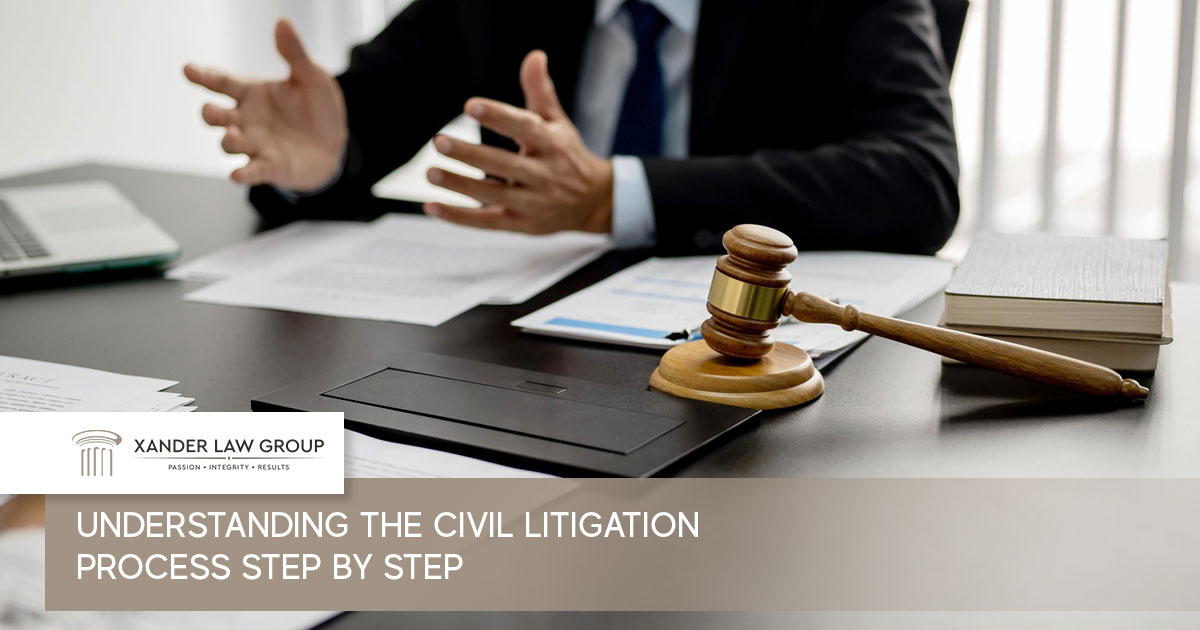Understanding The Civil Litigation Process Step By Step
Navigating the civil litigation process in Florida requires legal skill, strategic insight, and years of firsthand courtroom experience. Civil litigation is often a lengthy, expensive, and at times unpredictable process that can run for many years before judgment is finally given. If you have become embroiled in a legal dispute that is likely to become litigious, you must have a basic understanding of what civil litigation entails, so that you can meaningfully participate in consultations with your attorney and make an informed decision as to whether litigation is a road you want to go down.

What Is Civil Litigation?
Generally, any area of law that is not criminal law is considered to be civil law. This includes the law of contract, property law, tort, commercial law, family law, employment law, intellectual property law, competition law, maritime law, environmental law, etc. Civil litigation is the process by which a legal dispute that arises in relation to one or more of these areas of law is resolved through court proceedings. In essence, civil litigation proceedings involve exchanging legal filings outlining a claim or defense, providing evidence, and presenting argument to the court, which will then pass judgment on the matter. Breach of contract claims, personal injury suits, evictions, shareholder derivative actions, and defamation claims are all common examples of civil litigation proceedings.

The Florida Civil Litigation Process In Eight Steps
Florida’s rules of civil procedure are complex and set out many more procedural steps and processes than what is briefly described below. In reality, each civil case is unique, and the exact process that is followed will depend on the nature of the dispute, the merits of the case, the evidence presented, the conduct of the parties, and the procedural rulings of the court. However, most civil cases will involve the steps below, with the exception of steps 3 and 5.
1. Pre-litigation dispute resolution
Strictly speaking, civil litigation commences with the filing of a civil complaint (sometimes called a petition). However, almost all civil litigation involves certain pre-litigation processes. Usually, the party contemplating filing a civil complaint will first issue a letter of demand to the other party, giving them a certain period of time to address that party’s concerns (for example, repaying an overdue loan, retracting a defamatory statement, or refraining from certain conduct). Following the delivery of a demand letter, the parties might attempt to negotiate a mutually satisfactory resolution to the dispute or may use an alternative dispute resolution process such as mediation. It’s important to remember that settlement discussions can, in fact, arise at any point in the civil litigation process before judgment has been granted – often, settlement agreements are concluded on the eve of trial.
2. Draft and file a civil complaint
If the letter of demand yields no meaningful response, then the party who sent it will instruct their attorneys to begin drafting a civil complaint. A civil complaint sets out the legal principles and basic facts giving rise to that party’s claim for relief (relief simply refers to the outcome that the party wants – for example, to be repaid a certain amount of money or given compensatory damages). Once civil litigation proceedings have been initiated with the filing and service of a civil complaint, the filing party is referred to as the plaintiff, and the party who must respond to the complaint, the defendant. The defendant is given a certain amount of time in which to respond to the complaint, and must file what is referred to as an ‘answer’. Together, the complaint and answer are called the pleadings.
3. Request default judgment or file a motion to dismiss
In some civil cases, the defendant fails to file an answer. In these circumstances, the plaintiff may apply for ‘default judgment’ – in other words, they ask the court to resolve the matter on their version of events, in the absence of the other party’s arguments. Sometimes, instead of filing an answer, the defendant might choose to file a ‘motion to dismiss’. A motion to dismiss essentially alleges that the plaintiff has not made out a case at all, or that there is some fundamental flaw with their claim, and because of this, the matter should not proceed any further. For example, the defendant would ordinarily file a motion to dismiss if the plaintiff has sued them in a court that lacks jurisdiction.
4. Discovery and depositions
In ordinary civil litigation proceedings where no motion to dismiss or request for default judgment arises (or if these arise, but are rejected by the court), then the matter proceeds to the discovery phase. Discovery is the process by which the parties exchange all the evidence they intend to rely on – such as relevant information, documents, sound recordings, photographic evidence, and so on. Discovery is often the longest stage in the civil litigation process, as the parties can request further discovery when they believe that their opponent has not disclosed all relevant information. The parties can also send each other lists of written questions, which must be answered under oath, called interrogatories.
When the parties intend to rely on witnesses, depositions are a key part of discovery. During a deposition, a witness verbally provides their sworn testimony in response to questions posed by the opposing party’s attorney and their own, and this is then recorded and transcribed for use in the court proceedings. Depositions take place outside of court.
5. Motion for summary judgment
At any stage during or after the discovery process, either party may choose to file a motion for summary judgment. A motion for summary judgment essentially alleges that, given the evidence disclosed, there are no genuine disputes of fact between the parties, and the court should proceed to decide the matter on the legal principles alone. The party filing the motion for summary judgment claims, in other words, that they are entitled to judgment in their favor simply as a matter of law.
6. Trial
If discovery is concluded and no motion for summary judgment is filed, the matter will proceed to trial. Before the trial, the parties and presiding judge will have a meeting known as a ‘pre-trial conference’. At this meeting, they will resolve any procedural issues relating to the trial, discuss the key issues in dispute, raise evidentiary issues, agree on any special arrangements for the trial, and set a trial date. The trial can be heard by a judge (bench trial) or a jury (jury trial). At the trial itself, which may run over several days, weeks or even months, the parties will present their evidence, call witnesses to testify, and make their final legal arguments.
7. Judgment
Once the trial has concluded, the court (i.e., the bench or jury, as the case may be) will take time to consider the evidence presented and the merit of the legal arguments before handing down its judgment. For the plaintiff to be successful, they will need to show that their version of events is more likely true than not. This is known as the ‘preponderance of the evidence’ standard of proof. It is generally the standard of proof applicable in civil proceedings.
8. Appeal
After judgment has been granted, the unsuccessful party is afforded a limited period of time in which to file a civil appeal challenging the court’s decision, setting out why the decision is flawed, and requesting that the case be reconsidered by a higher court.

Exceptional Miami Civil Litigation Attorneys Are Ready To Represent You
To be successful in civil litigation proceedings, a party must meticulously research their legal position, collate and analyze relevant evidence with unmatched attention to detail, be able to strategically analyze every angle of the case, and preempt their opponent’s likely next steps, and present a lucid, compelling legal argument at trial. In practice, it is not the parties themselves that do this, but their legal team. It goes without saying, then, that hiring a reputable team of civil litigation attorneys with formidable experience and a track record of success is the best possible way to bolster your chances of receiving a favorable outcome.
The acclaimed team of civil litigation lawyers at Xander Law Group has years of experience between them in a wide range of practice areas, and are well-known for their passionate client representation and dedication to providing exceptional legal services. If you are facing a civil dispute and need only the best in your corner, contact us today at 1-305-767-2001.








